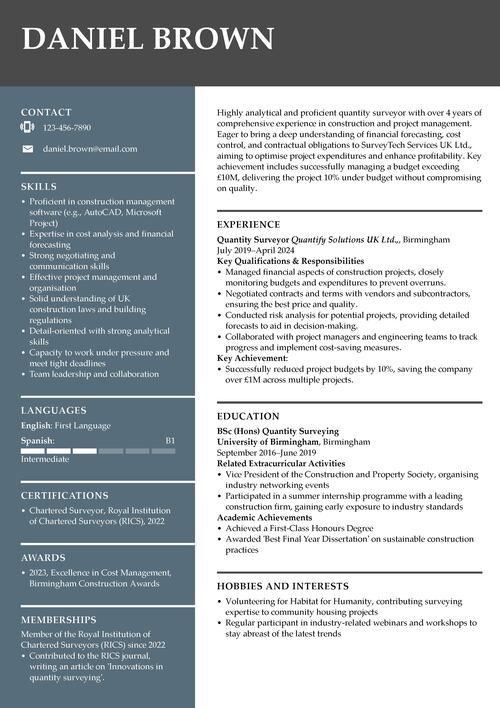Embarking on a job search can feel like a daunting task, especially when you know your next career move hinges on making a powerful first impression. For quantity surveyors, a profession that demands meticulous attention to detail, strong analytical skills, and clear communication, your CV isn’t just a document; it’s your personal blueprint, showcasing your professional capabilities and experience. It’s the key that unlocks the door to interviews, so crafting one that truly stands out is absolutely essential.
Many professionals find themselves wondering where to begin, especially when they want to highlight their specific skills in cost management, procurement, and project financial control. That’s where having a reliable framework comes in handy. While every individual’s journey is unique, a well-structured CV acts as a foundation, allowing you to effectively present your qualifications in a clear, concise, and compelling manner that resonates with hiring managers in the construction and development sectors.
Essential Components of a High-Impact Quantity Surveyor CV
When you’re putting together your professional profile, thinking about a robust cv template for quantity surveyor roles is incredibly helpful. The goal is to ensure every piece of information contributes to a holistic picture of your expertise. Recruiters typically scan CVs very quickly, so clarity and relevance are paramount. Your document needs to be easily digestible, highlighting your most impressive achievements and skills right from the start.
Crafting Your Professional Summary or Objective
At the very top, just below your contact details, lies the professional summary or objective. This short, impactful paragraph (or a few bullet points) is your elevator pitch. For quantity surveyors, this is where you concisely state your years of experience, key specializations (e.g., pre-contract, post-contract, civil engineering, commercial projects), and career aspirations. It should immediately tell the reader what value you bring to a potential employer and why you are the ideal candidate for a quantity surveying position. Make it engaging and tailored to the typical QS role.
Showcasing Your Work Experience
This is arguably the most critical section. For each previous role, list the company name, your job title (e.g., Junior Quantity Surveyor, Senior Quantity Surveyor, Commercial Manager), and the dates of employment. Underneath each entry, use strong action verbs to describe your responsibilities and, more importantly, your achievements. Quantify your accomplishments whenever possible. Did you manage projects worth a certain value? Did you identify cost savings? Did you implement a new procurement strategy that improved efficiency? Be specific. For instance, instead of "Managed project costs," say "Successfully managed project budgets up to £10M, consistently achieving 5% cost savings through rigorous value engineering and contractor negotiation."

Highlighting Education and Key Skills
Your educational background, including degrees, diplomas, and relevant certifications (like RICS accreditation), should be clearly listed with dates. Following this, dedicate a section to your key skills. This is an excellent place to include both technical competencies and soft skills relevant to a quantity surveyor.
- Technical Skills: CostX, AutoCAD, BIM software, Microsoft Project, Excel (advanced), contract law, risk management, tender preparation, post-contract administration, final accounts.
- Soft Skills: Negotiation, communication, problem-solving, analytical thinking, attention to detail, teamwork, leadership.
Relevant Projects Section
Consider adding a dedicated section for "Key Projects" if you have a strong portfolio. Briefly describe 3-5 of your most significant projects, outlining your role, the project’s scope, and the key challenges or achievements. This gives hiring managers a tangible sense of your practical application of skills and your ability to deliver results in real-world scenarios.
Tailoring Your Quantity Surveyor CV for Specific Roles
While a solid cv template for quantity surveyor roles provides a fantastic starting point, the real magic happens when you customize it for each application. Think of it less as a fixed document and more as a dynamic tool that you refine based on the specific job description you’re applying for. A generic CV might get overlooked, but one that speaks directly to the needs of the employer will instantly grab their attention.
Begin by thoroughly reading the job advertisement. Highlight keywords, required skills, and specific experiences that the employer is seeking. Then, go back through your CV and integrate these terms and concepts naturally. If the ad emphasizes "pre-contract cost planning," ensure your CV clearly outlines your experience in this area with specific examples. If "contract negotiation" is a key requirement, make sure your achievements section strongly reflects your negotiation successes. This targeted approach shows the hiring manager that you’ve not only read their requirements but also possess the precise skills they need.
Don’t be afraid to reorder sections or adjust the emphasis of certain bullet points to align with the job’s priorities. For instance, if the role is heavily focused on infrastructure projects, ensure your experience in such projects is prominently featured, even if it wasn’t your most recent work. Always focus on quantifiable achievements rather than just duties. Employers want to know what you accomplished, not just what you were responsible for. Did you complete a project under budget? By what percentage? Did you streamline a process? How much time or money did it save?
Finally, proofread your CV meticulously. A single typo or grammatical error can undermine your professionalism and attention to detail—qualities that are highly valued in a quantity surveyor. Have a trusted friend or colleague review it as well. A fresh pair of eyes can often spot mistakes that you might have overlooked. Remember, your CV is often the first, and sometimes only, impression you’ll make, so ensure it’s polished, precise, and perfectly represents your capabilities.
Your CV is a powerful marketing tool, and investing the time to refine it will undoubtedly pay dividends in your job search. By focusing on clarity, relevance, and impact, you significantly increase your chances of securing that coveted interview. Good luck!
